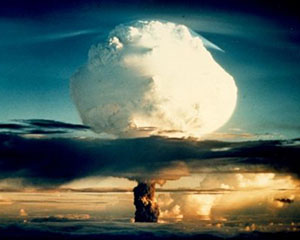
Event Review: Andrew Kurzrok and Gretchen Hund of PNNL at CSIS on June 6th
On June 6, Andrew Kurzork and Gretchen Hund of Pacific Northwest National Lab (PNNL) spoke at the Center for Strategic and International Studies outlining a unique proposal of having industries that manufacture technologies involved in nuclear weapons adopt measures to self-police themselves to help prevent nuclear weapons proliferation. Kurzork’s and Hund’s arguments are fully outlined in their piece in the Bulletin of the Atomic Scientists.
Their hope is that nuclear technology companies and those that could be regarded as dual-use technology companies will enter into arrangements within their industry, similar to the Kimberly Process that the diamond industry uses, to create additional efforts to prevent proliferation in the name of corporate sustainability. Dual-use technologies are those that can be applied towards the manufacture of a nuclear weapon but can be legitimately used in other fields.
 Having formerly worked at PNNL as a researcher developing new technologies to track and detect WMDs, managing proliferation and deployment threats of WMDs is an exceedingly difficult proposition that cannot easily be accomplished through just the clever application of technology alone. Recognizing this Kurzork and Hund have identified a weak spot in current non-proliferation efforts and have come up with a relatively simple concept that if it succeeds could drastically reduce the risk of the proliferation of nuclear weapons.
Having formerly worked at PNNL as a researcher developing new technologies to track and detect WMDs, managing proliferation and deployment threats of WMDs is an exceedingly difficult proposition that cannot easily be accomplished through just the clever application of technology alone. Recognizing this Kurzork and Hund have identified a weak spot in current non-proliferation efforts and have come up with a relatively simple concept that if it succeeds could drastically reduce the risk of the proliferation of nuclear weapons.
The idea is to bring the community of nuclear proliferation technology manufactures, including those who produce dual-use goods, into an agreement to create a third party system that can effectively self-police their activities. Those that do the best job of self-policing or preventing their products from being used improperly or were the most transparent about their compliance processes would potentially be recognized for their efforts by this third party system. These firms could then be rewarded by market forces and investors that consider corporate sustainability and responsibility when making their choices.
But with 68 different technologies identified under current import/export controls as dual-use technologies, and several more to be announced in the coming weeks whose manufactures have little idea that their technology could be used for proliferation activities, according to Kurzork and Hund, creating such an organization would be no small task.
Many of the manufactures in questions are small and medium sized operations that might not be fully aware of the role of their dual-use technology or may not want to suffer the overhead costs associated with such voluntary work.
To address this Kurzork and Hund pointed out a number of activities that could be undertaken in both the private and government sphere to encourage the creation of such voluntary third party systems.
 In the private sphere, larger companies that contract with the smaller companies, which might not be inclined to enter into such voluntary arrangements to prevent proliferation on their own initiative, could state that they will only do business with companies that enter into such a third party system. While these smaller companies may feel that they are small enough to escape the scrutiny of investors, especially if they are so small that they are not publically traded, larger companies that contract with them will be quite aware of what their investors might think and make it clear that they feel that corporate sustainability through non-proliferation is a must.
In the private sphere, larger companies that contract with the smaller companies, which might not be inclined to enter into such voluntary arrangements to prevent proliferation on their own initiative, could state that they will only do business with companies that enter into such a third party system. While these smaller companies may feel that they are small enough to escape the scrutiny of investors, especially if they are so small that they are not publically traded, larger companies that contract with them will be quite aware of what their investors might think and make it clear that they feel that corporate sustainability through non-proliferation is a must.
In the government sphere, Kurzork and Hund had a number of carrot and stick approaches to encourage the adoption of a third party system or even a framework that would encourage voluntary non-proliferation measures on the part of companies large and small.
Companies needed to be aware that the penalties for being found having assisted a proliferator intentionally or unintentionally were “terrifying enough” that companies would understand they had much to gain by self-policing in addition to traditional import/export compliance. At the same time those who entered into this proposed system may be granted access to benefits such as a fast track option in import/export approval by the Commerce Department.
It will be hard to encourage these dual-use technology manufactures to create and engage in such a third party system, but the potential benefits for them in terms corporate sustainability and for governments in terms of national security are great enough that the effort must be made.
Christopher Smith is a PhD student at the University of Arizona’s Department of Chemistry and Biochemistry with a focus on Analytical Chemistry.





